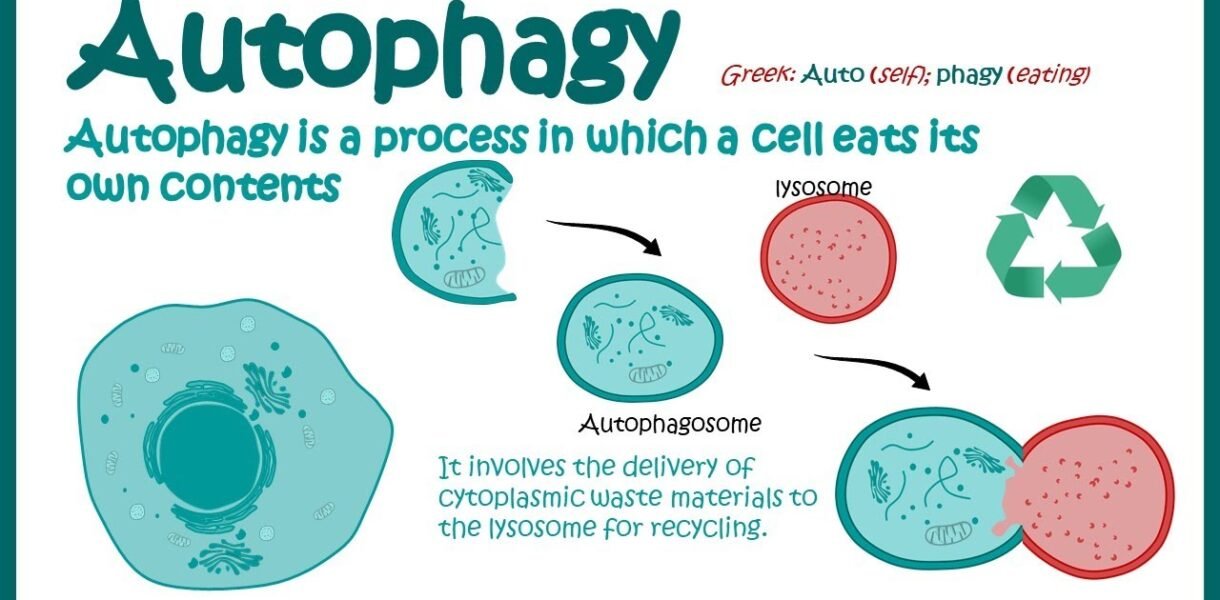Table of Contents
Ever wonder how your body cleans up shop at a cellular level? Get ready to discover the incredible world of autophagy! This process acts like your body’s own recycling system, breaking down old and damaged cell parts and transforming them into fuel and building blocks for new, healthy cells. It’s like a cellular fountain of youth, linked to benefits like fighting aging, boosting brainpower, and protecting you from disease. Intrigued? We’ll break down the science behind autophagy, explore its incredible health advantages, and give you actionable steps to activate this powerful process within your own body!
Autophagy exists to help ensure your survival
So today we’re going to talk about the real reason why autophagy exists.
Now, what is autophagy?
Autophagy is a condition of the body where you’re taking things that the body does not need anymore and putting it through a recycler, spitting out brand-new amino acids for both fuel and to be used as raw material to build tissue because a lot of the body is made from amino acids, protein.

Now that’s really, in simple terms, what it is. Now, why did we create this system? Well, we created it for one reason: to cope with starvation, or something about starvation that is against our survival. Okay, we don’t last long when we starve ourselves, but this system was created over eons, not just in our bodies, but other organisms as well, to cope with starvation or not eating.
So during starvation, as a survival mechanism, my body will basically take these damaged proteins that we don’t need anymore and just turn those into fuel and turn them into raw materials so we cannot be deficient in certain building blocks.
Damaged proteins are toxic to our bodies
But the other really cool thing about this is that these damaged proteins are very toxic to our body and it’s behind many diseases like:
- Diabetes type 2
- Alzheimer’s
- Parkinson’s
So it’s very, very beneficial for your survival to get these out of the body. The other thing about autophagy is that it will eliminate microbes and viruses because here’s the problem, you can’t kill a virus. But this is one way of getting rid of some of these microbes out of the body.
| Topic | Details |
|---|---|
| Definition of Autophagy | – A cellular recycling process – Breaks down old/damaged cell parts – Creates fuel and building blocks for new cells |
| Purpose of Autophagy | – Helps ensure survival, especially during starvation – Copes with lack of nutrients – Removes toxic damaged proteins |
| Health Benefits | – Anti-aging effects – Boosts brain function – Protects against diseases – Eliminates microbes and viruses |
| Diseases Linked to Damaged Proteins | – Type 2 diabetes – Alzheimer’s – Parkinson’s |
| Types of Damaged Proteins | – Misfolded proteins – Oxidized proteins – Mutated proteins – Glycated proteins |
| Factors Disrupting Autophagy | – High sugar levels – Severe inflammatory conditions |
| Activating Autophagy | – Fasting (especially 18+ hours) – Ketogenic diet – Regular exercise |
| Autophagy Timing | – Always occurring to some degree – Significant at 18 hours of fasting – Increases up to 20-24 hours – May plateau after 24 hours |
| Efficiency of Autophagy | – Improves with regular practice – Varies in different body parts |
| Key Nutrients | – Zinc helps degrade damaged proteins |
Now, what is a damaged protein? Okay, let’s just take the misfolded protein first.
To understand this, I just have to explain a little bit about DNA. DNA is basically the blueprints for making proteins, okay? So if the DNA, that has done copied to something called the RNA, so the RNA, which is a copy, travels out of the highly protected fortress that’s called a nucleus into the space outside, that’s still within a cell, to a protein factory, okay, it’s called a ribosome.
So these blueprints now are given to this little factory to make proteins, and it spits out this chain of amino acids in a certain sequence, okay? Then that folds, okay? So it combines in a certain pattern, looks kind of strange, but that’s what proteins look like, and then it’s activated.
So a folded protein is a 3D activated protein, and I’m not just talking about hair, nails, and skin. I’m talking about:
- Enzymes that help you digest
- Hormones
- Proteins that help detoxify

They do many things in the body. So when that protein misfolds, so it’s folded in the wrong way, it doesn’t work anymore, and it accumulates in the body, and it can turn into something called amyloid plaque. And that’s what’s in the cells that make insulin in diabetes type 2. That’s also in the brain in Alzheimer’s patients.
So the problem with this is that it gets stuck in there, and it inhibits function. Okay, guess what? Autophagy can get rid of this. And by the way, you need zinc also to help degrade this protein. So this is one type of protein.
Now, let’s take a look at other types of damaged proteins:
- Oxidized protein: When you combine something with too much oxygen, it can be altered in a certain way. Kind of like iron, if you expose it to oxygen, it turns into rust. Okay, so if you just envision this as this oxygen can rust out your proteins and damage them, and then they don’t work anymore. Well guess what, your body can actually take these and recycle them.
- Mutated proteins: which are altered maybe by a chemical or radiation or something like that. And then, guess what? That protein doesn’t work. It can be recycled, though.
- Glycated proteins: When you combine sugar with protein, you alter it and you make it very, very unusable, sticky, and it clocks things up.
One example I always use would be barbecued ribs. So you’re taking these ribs, this meat, and then you’re putting sugar or sauce on it, and then you’re cooking it. So when you’re consuming that, you’re consuming this damaged protein that doesn’t work very well in the body. So it will clog things up and develop something called advanced glycation end products. I have a lot of videos on this. You – I’ll put some links down below.
But this stuff builds up, clocks things up. It can actually get into your eye, into the lens of the eye, and cause cataracts. Well guess what? Autophagy cleans all this stuff up.
high sugar levels will disrupt autophagy process
But here’s what you need to know, this system of autophagy is not really an on/off type mechanism. Your body is always going through autophagy. Well, maybe not always. For instance:
- If you have high levels of sugar in the body, there’s probably no autophagy going on.
- Or if you have a severe inflammatory condition, you probably don’t have any autophagy going on.

But for most people, some type of recycling is going on, especially if you’re doing keto or you’re exercising. But most definitely when you’re fasting. So the more fasting that you do, you can create these huge effects with autophagy.
18 hours of fasting autophagy
So it’s all a matter about degrees. How much autophagy are you in?
Because people will ask, “Well, how long do I have to fast before I get into autophagy?” Well, you’re already in autophagy. But I will say that when you get to 18 hours, you’re in some pretty good autophagy. And as you go to 20 hours, it’s more. If you go a little longer, it’s going to be more. But there’s going to be a certain point where it kind of plateaus. And some studies are saying 24 hours, and other studies just a little bit more, a little bit less. So they don’t really know. The reason is because each part of your body has its own autophagy.
For example, there’s an entire mitophagy which recycles mitochondria. That’s the energy factor of the cell. There’s other types of autophagy in your bone or on your lung, or in your liver. So it’s not an exact thing, and it’s very difficult to calculate.

However, if I were you, I would just focus on doing all three of these things and trying to get to 18 hours or a little longer. And also, as you exercise and do more of it, your efficiency with autophagy improves, so you actually get more autophagy than someone just starting out.
So the benefits of autophagy are huge. It’s an anti-aging benefit, plus it’s getting rid of things that are very unhealthy for your body that can end up in degenerative diseases and inflammation. So you have the combination of getting rid of this and enhancing new body tissue. It’s pretty cool.
key Points
- Autophagy exists to help ensure your survival, particularly in times of starvation. It’s a condition in your body in which damaged or worn-out proteins are recycled and used to create new amino acids for both fuels and to build new tissues. Autophagy evolved over eons.
- The damaged proteins are toxic to our bodies. They’re behind type 2 diabetes, Alzheimer’s, and Parkinson’s, for example. So it’s obvious that you benefit from getting these toxic proteins out of your body.
Autophagy will also eliminate microbes and viruses.
Proteins can be misfolded, oxidized, mutated, or glycated. As an example, when it is misfolded, after it’s initially formed in your DNA, it no longer works and can accumulate in your body, leading to amyloid plaques. The plaquing can lead to type 2 diabetes and Alzheimer’s. (By the way, you also need zinc to help with the cleanup process.)
- Glycated proteins result from consuming a combination of protein and sugar, such as you’d find in barbequed ribs. This can lead to something called advanced glycation end products; check below the video for links to some of my other videos about this.
- Autophagy isn’t really an on/off process. Your body is designed to always be in autophagy; but, if you have high levels of sugar in your body or a severe inflammatory condition, it’s probably not happening. Most people do have some going on, and especially if you’re doing keto, exercise, and definitely if you’re intermittent fasting. You can create enormously beneficial effects for your health, the more fasting you do. Though you’re probably always in autophagy, by the time you get to 18 hours of fasting you’re in a serious degree of it.
- However, there’s a certain point where autophagy plateaus. Some studies say 24 hours; others say a little bit more or less. We still have much to learn. And each part of your body has its own autophagy. One, for instance, is specific to the mitochondria that are the powerhouse of your cells. Or others are specific to your bones, or lungs.
If I were you, I’d focus on doing keto, exercise, and intermittent fasting to spur your autophagy to its highest possible degree, for the most health benefits..
DATA
https://www.ncbi.nlm.nih.gov/pmc/articles/PMC8488577
FAQ
How Long Should I Fast for Autophagy?
The optimal fasting duration to induce significant autophagy is still an area of active research, but current evidence suggests the following:
Minimum Fasting Duration
- At least 16 hours of fasting is generally required to start seeing increases in autophagy markers[1][2][3].
Optimal Fasting Duration
- Many studies indicate that autophagy levels peak after 36-72 hours of fasting[1][3].
- Fasting for 2-4 days may be needed to maximize the benefits of autophagy[1][3].
Considerations
- Longer fasts over 2-3 days can lead to rapid physiological changes that may require medical supervision, especially for those with chronic conditions[1][3].
- Shorter 16-24 hour fasts done regularly (e.g. daily intermittent fasting) can also provide autophagy benefits, though to a lesser degree than extended fasts[2][3].
- Individual responses to fasting can vary based on factors like age, metabolism, and health status[1][3].
The best fasting duration depends on your goals, health status, and ability to fast safely. Consulting a healthcare provider is recommended before attempting extended fasts.
Is Autophagy Good for the Body?
Autophagy is a complex process that can have both beneficial and detrimental effects on the body, depending on the specific context:
Beneficial Effects of Autophagy
- Removes damaged organelles, misfolded proteins, and pathogens, improving cellular health[2][4]
- May help prevent diseases like cancer, neurodegeneration, diabetes, and heart disease[2][4]
- Can enhance metabolic flexibility and energy regulation during stress[3][4]
- May contribute to longevity and healthy aging by clearing cellular waste[2][4]
Detrimental Effects of Autophagy
- Excessive autophagy can lead to cell death and tissue damage in some cases[4][5]
- Dysregulated autophagy has been linked to certain cancers, autoimmune disorders, and neurological diseases[4][5]
- The effects of autophagy can be context-dependent, with both protective and harmful roles in disease[4][5]
Overall, moderate and well-regulated autophagy appears to be essential for cellular and organismal health. However, the balance must be carefully maintained, as both insufficient and excessive autophagy can have negative consequences.[4][5]
Why is Autophagy Bad?
While autophagy is generally considered a beneficial cellular process, there are some situations where excessive or dysregulated autophagy can be detrimental:
Excessive Autophagy
- In certain cancers, autophagy can act as a survival mechanism, allowing tumor cells to adapt to stress and resist treatment[4][5]
- Uncontrolled autophagy can lead to excessive cell death and tissue damage in some contexts[4][5]
Insufficient Autophagy
- Impaired autophagy has been linked to the development of neurodegenerative diseases, such as Alzheimer’s and Parkinson’s, due to the accumulation of toxic proteins[4][5]
- Reduced autophagy is also associated with aging and age-related diseases, as the body’s ability to clear cellular waste declines[2][4]
Context-Dependent Effects
- The effects of autophagy can be highly context-dependent, with both protective and harmful roles in disease processes[4][5]
- The balance of autophagy must be carefully maintained, as both too little and too much can have negative consequences[4][5]
It’s important to note that the research on the precise role of autophagy in health and disease is still ongoing. While dysregulated autophagy can be detrimental, moderate and well-regulated autophagy is generally considered essential for cellular and organismal health.[4][5]
Is 16 Hours Fasting Enough for Autophagy?
While 16 hours of fasting is generally considered the minimum duration to start seeing increases in autophagy, it may not be enough to maximize the potential benefits:
Minimum Fasting Duration for Autophagy
- Most studies suggest that at least 16 hours of fasting is required to begin stimulating autophagy[1][2][3].
Optimal Fasting Duration for Autophagy
- Many researchers indicate that autophagy levels peak after 36-72 hours of fasting[1][3].
- Fasting for 2-4 days may be necessary to achieve the maximum benefits of autophagy[1][3].
Considerations
- Shorter 16-24 hour fasts done regularly (e.g. daily intermittent fasting) can also provide autophagy benefits, though to a lesser degree than extended fasts[2][3].
- Longer fasts over 2-3 days can lead to rapid physiological changes that may require medical supervision, especially for those with chronic conditions[1][3].
- Individual responses to fasting can vary based on factors like age, metabolism, and health status[1][3].
In summary, while 16 hours of fasting is a good starting point to initiate autophagy, longer fasts of 36-72 hours may be needed to maximize the potential benefits. However, the optimal fasting duration can vary depending on individual factors and health considerations.[1][2][3]
Autophagy Benefits for Skin
Autophagy has been shown to have several potential benefits for skin health and appearance:
Improved Skin Cell Renewal
- Autophagy helps remove damaged or dysfunctional cells, allowing for the generation of new, healthier skin cells[2][4].
- This can lead to improved skin texture, tone, and overall radiance.
Reduced Skin Aging
- Autophagy helps clear away accumulated cellular waste and damaged organelles, which can contribute to skin aging[2][4].
- By maintaining cellular health, autophagy may help slow down the visible signs of skin aging, such as wrinkles and age spots.
Enhanced Skin Barrier Function
- Autophagy plays a role in the maintenance and repair of the skin’s protective barrier[2][4].
- A well-functioning skin barrier can improve moisture retention and protect against environmental stressors.
Potential Anti-Inflammatory Effects
- Autophagy has been shown to have anti-inflammatory properties, which may be beneficial for conditions like acne, eczema, and psoriasis[2][4].
Improved Wound Healing
- Autophagy can support the skin’s natural healing processes, potentially enhancing wound repair and scar reduction[2][4].
While more research is needed, the current evidence suggests that supporting healthy autophagy levels through lifestyle factors like fasting, exercise, and a balanced diet may have positive impacts on skin health and appearance.[2][4]
Autophagy Fasting
Autophagy fasting refers to the practice of deliberately inducing autophagy through periods of fasting. This is done to potentially harness the various health benefits associated with autophagy, such as improved cellular function, reduced inflammation, and enhanced longevity.
How to Induce Autophagy Through Fasting
- Fasting for at least 16 hours is generally considered the minimum duration to start seeing increases in autophagy markers[1][2][3].
- Many studies indicate that autophagy levels peak after 36-72 hours of fasting, suggesting that longer fasts of 2-4 days may be needed to maximize the benefits[1][3].
- Shorter 16-24 hour fasts done regularly (e.g. daily intermittent fasting) can also provide autophagy benefits, though to a lesser degree than extended fasts[2][3].
Considerations for Autophagy Fasting
- Longer fasts over 2-3 days can lead to rapid physiological changes that may require medical supervision, especially for those with chronic conditions[1][3].
- Individual responses to fasting can vary based on factors like age, metabolism, and health status[1][3].
- Consulting a healthcare provider is recommended before attempting extended fasts to ensure safety and efficacy.
Potential Benefits of Autophagy Fasting
- Improved cellular health and function
- Enhanced metabolic flexibility and stabilized energy levels during stress
- Reduced inflammation and oxidative stress
- Protection against diseases like cancer, neurodegeneration, and heart disease
- Improved immune function and longevity[1][2][3][4]
While the research on autophagy fasting is promising, more studies are needed to fully understand its long-term effects and optimal implementation. As with any significant dietary change, it’s important to approach autophagy fasting cautiously and under the guidance of a healthcare professional.[1][2][3][4]
Autophagy Fasting Benefits
Autophagy fasting, the practice of deliberately inducing autophagy through periods of fasting, has been associated with a range of potential health benefits:
Improved Cellular Health and Function
- Autophagy helps remove damaged organelles, misfolded proteins, and pathogens, improving overall cellular function[2][4].
Enhanced Metabolic Flexibility and Energy Regulation
- Fasting-induced autophagy can enhance the body’s ability to switch between glucose and fat metabolism, improving energy regulation during stress[3][4].
Reduced Inflammation and Oxidative Stress
- Autophagy has been shown to have anti-inflammatory properties and can help mitigate oxidative stress within cells[2][4].
Protection Against Chronic Diseases
- By improving cellular health and function, autophagy may help prevent the development of diseases like cancer, neurodegeneration, diabetes, and heart disease[2][4].
Improved Immune Function and Longevity
- Autophagy plays a role in immune system regulation and may contribute to healthy aging and increased lifespan[2][4].
Potential Benefits for Skin Health
- Autophagy can support skin cell renewal, reduce visible signs of aging, and enhance the skin’s barrier function[2][4].
It’s important to note that while the research on the potential benefits of autophagy fasting is promising, more long-term studies in humans are needed to fully understand its effects and optimal implementation. Consulting a healthcare provider is recommended before attempting extended fasts or significant dietary changes.[1][2][3][4]
Autophagy Journal
There is no single, dedicated “autophagy journal” per se, as the topic of autophagy is interdisciplinary and covered in various scientific journals across different fields. However, some of the key journals that frequently publish research on autophagy include:
Autophagy
- This is a peer-reviewed journal focused specifically on the topic of autophagy and its role in health and disease.
- It covers a wide range of research, from basic molecular mechanisms to clinical applications.
Cell Metabolism
- This journal publishes research on the cellular and molecular mechanisms underlying metabolic processes, including the role of autophagy.
Nature Cell Biology
- A highly respected journal that covers a broad range of cell biology research, including studies on autophagy.
Molecular Cell
- Publishes high-impact research on the molecular underpinnings of cellular processes, such as autophagy.
Journal of Cell Biology
- Focuses on fundamental cell biology research, with a strong emphasis on studies related to autophagy.
Trends in Cell Biology
- This review journal covers the latest developments and trends in cell biology, including the field of autophagy.
Aging Cell
- Publishes research on the cellular and molecular mechanisms of aging, including the role of autophagy.
While these journals are some of the most prominent outlets for autophagy research, the topic is also covered in a wide range of other scientific journals, depending on the specific focus and applications of the study.[1][2][3][4][5]
Signs of Autophagy
Detecting the signs of autophagy can be challenging, as it is a complex and dynamic cellular process that is not easily measured. However, there are several indirect markers and indicators that can suggest the activation of autophagy:
Metabolic Markers
- Increased levels of ketone bodies, such as beta-hydroxybutyrate, can indicate a shift towards fat metabolism and the potential activation of autophagy[3].
- A lower Glucose Ketone Index (GKI) value, around 1.0, may also signal the onset of autophagy[3].
Molecular Markers
- Increased levels of autophagy-related proteins, such as LC3-II and Beclin-1, can suggest the induction of autophagy[2][4].
- Decreased levels of the autophagy substrate p62/SQSTM1 may also indicate active autophagy[2][4].
Physiological Signs
- Feelings of increased energy, mental clarity, and reduced hunger during extended fasts may be indirect signs of autophagy[3].
- However, these subjective experiences can vary greatly between individuals and are not definitive markers of autophagy.
Imaging Techniques
- Advanced imaging methods, such as electron microscopy or fluorescence microscopy, can directly visualize the formation of autophagosomes and autolysosomes, which are hallmarks of active autophagy[2][4].
Limitations
- Accurately measuring autophagy levels in humans is challenging, as most techniques require invasive tissue sampling or specialized equipment[2][4].
- The relationship between indirect markers and the actual degree of autophagy activation is not always straightforward and can be influenced by various factors[2][4].
It’s important to note that the signs of autophagy can be subtle and complex, and the best way to assess its activation may be through a combination of different markers and techniques, in consultation with healthcare professionals.[1][2][3][4]
Autophagy vs Apoptosis
Autophagy and apoptosis are two distinct cellular processes that play important roles in maintaining cellular homeostasis and overall health:
Autophagy
- Autophagy is a process where the cell degrades and recycles its own damaged or unnecessary components, such as organelles and proteins[2][4].
- This process helps to maintain cellular function and can be induced by various stressors, such as nutrient deprivation or oxidative stress.
- Autophagy is generally considered a protective and adaptive response that can help the cell survive under challenging conditions.
Apoptosis
- Apoptosis is a form of programmed cell death, where the cell actively initiates a series of events leading to its own destruction[4][5].
- This process is often triggered by specific signals or stimuli, such as DNA damage or the activation of certain signaling pathways.
- Apoptosis is a normal and regulated process that plays a crucial role in development, tissue homeostasis, and the immune response.
Key Differences
- Autophagy is a recycling process, while apoptosis is a cell death process.
- Autophagy can help the cell survive under stress, while apoptosis leads to the cell’s demise.
- Autophagy is generally considered a protective mechanism, while apoptosis is a form of programmed cell death.
- The molecular pathways and signaling cascades involved in autophagy and apoptosis are distinct, though they can sometimes interact and influence each other.
Relationship Between Autophagy and Apoptosis
- In some cases, autophagy and apoptosis can work together, with autophagy initially trying to salvage the cell, but if the stress is too severe, apoptosis may be triggered as a last resort[4][5].
- Dysregulation of the balance between autophagy and apoptosis has been implicated in the pathogenesis of various diseases, such as cancer, neurodegeneration, and autoimmune disorders.[4][5]
Understanding the interplay between autophagy and apoptosis is an active area of research, as it may provide insights into the development and potential treatment of various health conditions.[4][5]
Side Effects of Autophagy
While autophagy is generally considered a beneficial cellular process, there are some potential side effects and risks associated with inducing or manipulating autophagy:
Excessive Autophagy
- In some cases, excessive or uncontrolled autophagy can lead to cell death and tissue damage[3].
- This has been observed in certain disease contexts, such as some types of cancer, where autophagy may act as a survival mechanism for tumor cells[3].
Insufficient Autophagy
- Impaired or reduced autophagy has been linked to the development of various diseases, such as neurodegenerative disorders, due to the accumulation of toxic proteins and cellular waste[2].
- Decreased autophagy is also associated with aging and age-related diseases, as the body’s ability to clear cellular debris declines[2].
Rapid Physiological Changes
- Attempting extended fasts (over 2-3 days) to induce high levels of autophagy can lead to rapid physiological changes, such as electrolyte imbalances and dehydration[4].
- These rapid changes may require medical supervision, especially for individuals with chronic health conditions or taking certain medications[4].
Individual Variability
- The response to fasting and other methods used to stimulate autophagy can vary greatly between individuals based on factors like age, metabolism, and health status[1].
Potential Adverse Effects on Specific Conditions
- For example, research suggests excessive autophagy can cause the death of cardiac cells, which may contribute to heart troubles[3].
- While other studies have shown that autophagy may prevent tumors from forming in the early stages of cancer, it may also encourage tumor growth by helping cancer cells function more efficiently in later stages[2].
It’s important to note that most studies on the relationship between autophagy and disease have been conducted on animals, and more human research is needed to fully understand the potential side effects and risks[2]. Consulting with a healthcare provider is recommended before attempting any significant dietary changes or extended fasts to induce autophagy.




